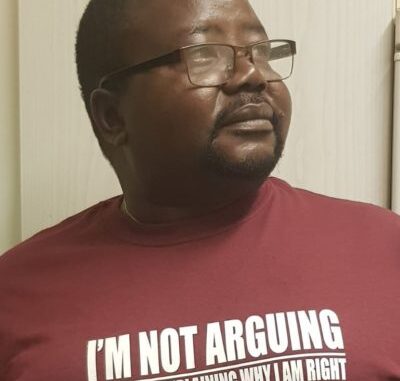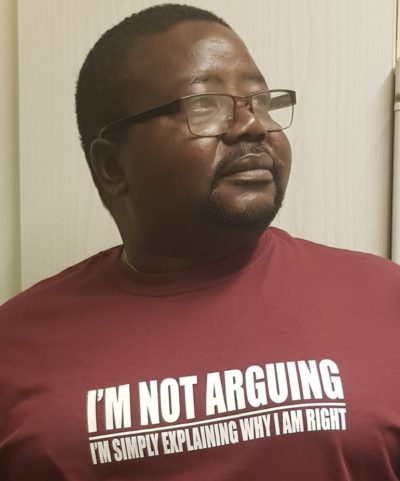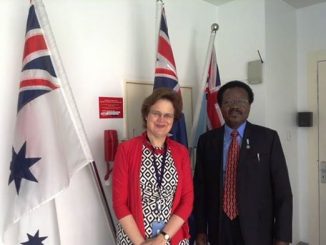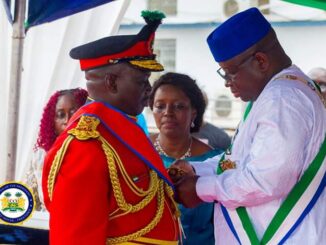
Do Those Who Make Peaceful Revolutions Impossible Make Violent Revolution Inevitable?
According to the Global Peace Index of 2023, Sierra Leone ranks 47th among 83 most peaceful countries in the world, above Ghana, Zambia, France, etc (Institute for Economics and Peace). Interestingly, there are a lot of Sierra Leoneans who might beg to differ, judging from events on August 10, August 22, October 26 etc. This is because, most people’s rating of violence in Sierra Leone is taken at face value and based on perception and anecdotes. However, Sierra Leone was a synonym for violence in the 90s, thanks to the rebel war. So, have we moved on from the ravaging clutches of violence since then?
Unfortunately, Sierra Leone dropped 10% mid 2019, one year after President Bio was elected and one year after the APC lost the election. Got my drift? Irrespective of your political persuasion, it is an irrefutable fact that most of the violence in our country is triggered by our politics. To address this cancer in our society, should Sierra Leoneans be looking at the triggers, the drivers, the participants, perpetrators, and antecedents of political violence in our country? One would hope that these will be considered in the yet to commence Tripartite dialogue that was initiated by the International Community.
There are many reputable schools of thought, research, and policy makers which conclude that a marked number of political violence increased since 2012. They include Armed Conflict Location & event data Project (ACLED), West Africa Network for Peacebuilding-Sierra Leone (WANEP-SL), Sierra Leone-Local Event Dataset (SL-LED) etc. Most of the data suggests that political violence started to increase around 2014 and 2015 and peaked around the 2018 elections. You do the math in coincidences. Even though our democracy is still embryonic in comparison to other countries, we must avoid the temptation to accept the seeming notion that political violence and general disorder are unavoidable ingredients of peace building or emerging democracies. No excuses.
The current situation in Sierra Leone does not make for good reading. Many see the events of November 26th as a watershed of accumulated socio-economic rumblings that have been gestating in the bowels of our political anatomy. Some believe that it was inevitable, and just a matter of time before the lava spilled through the political fissures. In Sierra Leone today, our political lifeblood is now oxygenated by a cycle of fear, anger, and violence. Bertrand Russell’s notion that “Collective fear stimulates herd instinct and tends to produce ferocity toward those who are not regarded as members of the herd” cannot be more apt.
The debacle that ensued after the June elections saw our main parties draw their respective redlines, much to the chagrin of the masses. These redlines may have served a sumptuous dish for the palates of their respective supporters, but at what cost? As the room for compromise, manoeuvre and negotiations continued to shrink with each passing threat, it was left to the court of public opinion to adjudicate between SLPP and APC, as each party tried to shake hands with clenched fists.
There is no doubt that the June elections was anticipated with violent excitement. Looking back to the 90s, and in comparison to what obtains today, you would be forgiven to conclude that our penchant to preserve barbarism is unrivalled. Unfortunately, it is not our apparent tendency to relapse into barbarism but worryingly, our seemingly conscious effort to seek barbarism out. We know that violence is the last refuge of the incompetent. Equally, we know that “The only thing necessary for the triumph of evil is for good men to do nothing,”
So, how, and when did we arrive here?
The signs of moral decadence have been hiding in plain sight, as we watched people abandoned the law and sought perceived justice by taking the law into their hands. We trumpeted the concept of democracy into the high heavens but discarded basic tenets of the rule of law. We turned a blind eye to “foreign citizens” from afar inciting the youths about their rights, but conveniently ignored the caveat of responsibilities that come with those rights. As freedom of speech became a social badge of honour, we presided over a system that morphed our youth into a mob mentality of cynicism and gullibility. Using mass media and with their audiences and “followers” ready at all times to believe the worst, no matter how absurd, and did not particularly object to being deceived because it held every statement to be a lie of their own convictions, they manipulated the youth into antisocial behaviour.
Sadly, those with responsibilities and in positions of power and influence superimposed their parochial political allegiances on their patriotic duty. They allowed geographical boundaries to cut through the umbilical cords that held us as a nation, as a people, and as a country. Just because of our linguistically dialectical differences, we allowed the lunatics to take over the asylum. We cheered them on, goaded them, and made them overnight celebrities as the art of gentlemanly insult gave way to moral depravity. By becoming and remaining selectively silent, we became the enablers of the menu on our breakfast tables. That is because, for evil to triumph, it took the good among us to do nothing.
However, one cannot summarily dismiss the concerns and angst expressed by the disgruntled. The scatology of verbal insults these days is one of the clearest signs of our moral decline. As our country became intolerant of alternative views, we accepted, elevated and normalised Mammy Cuss, like the lingua franca. It is easy to see an insult as a spontaneous utterance inspired by anger, frustration, hatred, and contempt. We cannot dismiss the merits of the concerns and issues expressed. Is impossible to express them without resorting to gutter language? We deluded ourselves into believing that dimming another person’s light will make ours brighter. Collectively, we allowed our politicians to turn us against one another to distract us from turning against them. Our “Komanehs” and “Ndaymias” became mortal enemies, while our leaders received their weekly Holy Communion from the same Reverend. Sometimes, we even forget that “Korthor” married “Ngor’s” sister.
If the current political situation represents a watershed that is at crossroads. Like any other nation, there will always be a chasm or divide between our political parties. Sadly, the last two decades have seen this fissure become the Kyber Pass. Our politics has become so toxic that you could be forgiven to think that it’s an Olympic blood sports. Is it any wonder that this has led to a political vacuum of some sorts? As a nation, have we lost the ability to settle our differences amicably in house? Why is it that each time we have our political differences, it’s a 100-meter sprint to the international community to intercede? Is it any surprise that the European Union, ECOWAS, and USA have become our political VARs to monitor our champions league political matches? Has Sierra Leone become so inept to manage our own affairs, that suddenly we have become landlords to the international community, on matters of domestic affairs? Do we need adult supervision or political baby-sitting to manage our affairs? Which brings us to the next point about the current American Ambassador to Sierra Leone, Bryan David Hunt.
America has been central to the political reconstruction that followed the June 23 demolition job to democracy. With the carrot and stick approach, America and by extension its embassy has been trying our way out of the impasse. Notwithstanding the diplomatic gridlocks it has pursued the line of reconciliation, by dragging our leaders to the round table conference for a tripartite dialogue. It is unfortunate that events on November 26 seem to upend the proceedings. For the sake of Mama Salone, we pray and hope that this dialogue is resumed for the benefit of us all. It should serve as a moment of reflection, healing, and resolutions on the way forward.
To all intents and purposes, Mr Hunt, together with other partners has been working hard to bring things to fruition. Nevertheless, his latest media appearances are raising eyebrows as he seems to be doing a running commentary on the political side of things. According to thesierraleonetelegraph.com (30/12/23), “the US ambassador said that ongoing judicial investigation into the alleged coup must not be conflated with the ongoing peace dialogue between the government and the opposition APC and calls for all involved to continue the implementation of the signed peace accord which was brokered by the international community to end months of political chaos and uncertainty in the country”. Amen and Hallelujah to that.
However, his “I don’t believe that any legitimate political actor in Sierra Leone would back what happen on November 26,” … “When we talk about the investigation for November 26th, we’re talking about investigating and holding accountable individuals for their individual actions. Sierra Leone does not believe in collective punishment, nor does the Universal Declaration of Human Rights. So, we do not punish a political party or any organization for the individual actions of its members.”
Many well-meaning Sierra Leoneans would applaud Mr Hunt his reconciliatory stance, but others would question the wisdom of commenting on an ongoing investigation with such affirmation in “I don’t believe that any legitimate political actor in Sierra Leone would back what happened on November 26,”. Some members of the green brigade are spitting feathers and calling his views prejudicial, especially while investigations into the alleged coup are ongoing. Others might find it undiplomatic, and wished those were words spoken behind the confines marble walls. Looking at the DNA of the alleged coup plotters, it is plausible that Mr Hunt, with the best of intentions is trying to dismiss any perception that the party opposite was coup friendly. Is that why some think that as an outsider, he might be crying more than the bereaved?
Irrespective of your political persuasion, the current status quo between our political parties is not sustainable. It’s time our country came back to its senses. They say that, so long as the bed shakes regularly, there is peace in the house. Despite your political inclination, if Mr Hunt can help make the bed shake regularly again, you wonder how many will care if he is an outsider or harbinger. Interestingly, Mr Hunt complimented our country that Sierra Leone does not believe in collective punishment, nor does the Universal Declaration of Human Rights. That is irrefutably true, but you wonder if some people somewhere below the north but close to the Eastern part of the globe are familiar with that language. Sierra Leone abolished the death penalty for God’s sake, not like the preacher man’s backyard. I hope the tripartite dialogue takes place and I wish one of the goals of the future will be to stop POLITICAL VIOLENCE. I pray our politicians will become addicted to that goal. No VAR will be required then.
Now that President Bio is in his second term, is it time to forget the politics of promising heaven and delivering purgatory, and claiming hero status for saving the country from hell? Is it time to go back to the drawing board of kitchen table economics?
Don’t forget to turn the lights off when you leave the room.
Abdulai Mansaray




